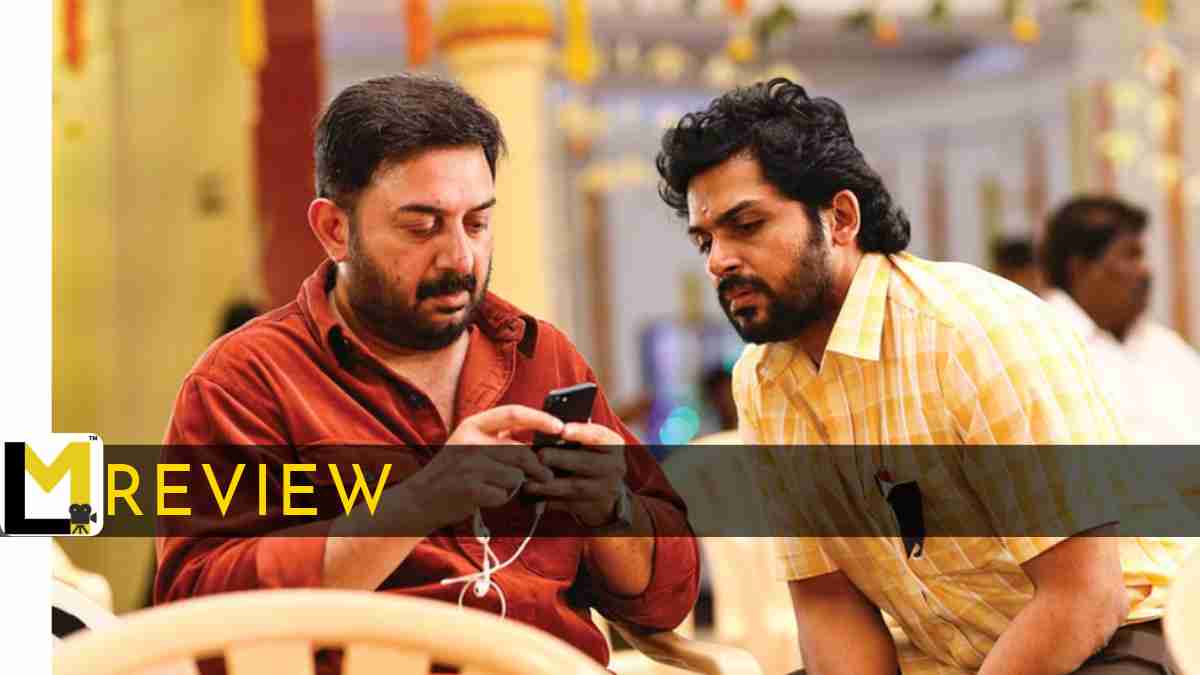Meiyazhagan, C Prem Kumar’s second movie after the magnificent “96”, has the same texture in terms of treatment. Even if you look at the core idea of the movie, Arulmozhi, the central character of this movie, and Ram of 96 has certain emotional similarities. The movie puts you in the space of a joyous onlooker, observing two real and vulnerable men talking their hearts out. With nuanced storytelling that contains drama and emotions very sensibly, Meiyazhagan is one of the purest feel-good films I have seen in a long time.
The movie is primarily about Arulmozhi, a man who had to move out of Thanjavur back in 1996 when he was in his late teens because of family partition. The city and that house meant a lot to him, and the memories are so rooted that thinking about it puts him in an uncomfortable space. Twenty-two years later, he was forced to come back to his hometown because his cousin-sister, who he practically raised, was getting married. Arul’s hesitant journey to his hometown and the interesting things that happened in his life when he met a relative during the function are what we see in Meiyazhagan.
C Prem Kumar established his signature with his first movie, and that rawness in capturing the emotions of the characters is visible in Meiyazhagan as well. How much his ancestral home and the Thanjavur town mean to Arul has to be established in order to make us understand why the journey back to that town is difficult for him. Even in 96, when Janu makes an appearance almost one hour into the movie, we can sense the same tension in Ram because we have seen the flashback through Ram’s memory. In the case of Meiyazhagan, Prem Kumar is only taking 10-15 minutes to establish that emotional connection. The capturing of that pain is so impactful that when we see Arul reconnecting with each of his relatives and that scene on the stage, with his cousin who is getting married, you would feel the 22 years of longing the characters feel.
In the second half, the story takes some drastic turns in order to give us an idea about the character played by Karthi. We slide into various subplots, one featuring Jallikkattu, another that talks about the history of Tamilnadu, and another one that deals with the Srilankan Tamils. Those portions had a sharp contrast with the family drama nature of the movie, and there wasn’t anything connecting these three subplots. To be honest, while I was watching the film, I thought the CSK+ Jallikkattu story was a commercial compromise from Prem Kumar. But we get to see how those diverse topics were used to give us an idea about the passion and empathy of this character, and there is a reason why he is telling all these things to Arul.
What is so beautiful about Prem Kumar’s way of presenting characters is that even when they are not doing anything significantly visible, we as an audience would be able to read them like how one can read the discomfort or happiness of their best friend. The typical theatrical presentation of conflicts is not there in this movie, and the anxiety that Arul goes through feels very personal. The guilt he feels before the very final act in the film is a really tough one to communicate cinematically. But by building the equation beautifully and smoothly, Prem Kumar puts us in an emotional space where we would empathize with Arul.
Mahendiran Jayaraju, who was one of the cinematographers of 96, has done the cinematography for Meiyazhagan, and the frames are full of life. They are very aware of the pacing of the narrative, and a larger chunk of the movie uses static shots. After the first viewing, I can’t really say whether songs other than Yaaro Ivan, sung by Kamal Hassan, would make it to my playlist, but I will be definitely waiting for the original background score from Govind Vasantha. The elevation this movie gets through the apt placement of the background score is surreal.
Arvind Swamy, as Arul, performs the part with utmost realness. You get to see him transforming into various versions of his character as the story evolves, and without much dramatic effort, he makes us feel the suffocation of that character. The care, the guilt, the playfulness, etc., feels so lively. Karthi’s character is that loud, typical villager character, and it has similarities with those B and C center movies he does occasionally. But since Prem Kumar isn’t a fan of loud melodrama, this particular character becomes a source of genuine humor because of the character’s purity. Karthi, as a narrator, is so good at keeping the audience glued to the screen. His performance is so effective that Prem Kumar only had to put an insert shot of gunfire and the rest through sound design during an elaborate scene where he speaks about history and political events.
Sri Divya and Devadarshini were paired opposite to these leading men, and they both captured the essence of their characters neatly on screen. Rajkiran gets to be this Paasam-overloaded uncle yet again, but this one felt more real. Swathi Konde, Jayaprakash, and Saran Shakthi, as the younger Arul, are the other major names in the cast.
Towards the end of the movie, there is a phone conversation between the main characters. The transition of that scene from being in a neutral space to a sad phase and then to a really happy conclusion is a joy to watch. It’s like a healthy exercise to your cheek. The movie is 177 minutes long, and I looked at my phone only once, and that too to stop the vibration due to a call. Meiyazhagan is one of those rare pleasant films that gives you teary-eyed secondhand happiness.
Meiyazhagan is one of those rare pleasant films that gives you teary-eyed secondhand happiness.
Green: Recommended Content
Orange: The In-Between Ones
Red: Not Recommended


